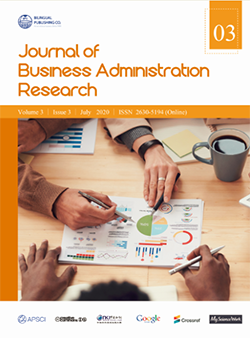The International Mobility of Students Apprentices at the Heart of Building a Skills Economy: the Example of the Corsican Territory
DOI:
https://doi.org/10.30564/jbar.v3i3.1877Abstract
At a time of exacerbated globalization, education, and more generallytraining, is a key factor for our society, at the heart of territories challenged to renew themselves in the face of the emergence around the globeof new centers of economic and demographic gravity, with their ownmodels. Training, and its link with working life, is a real challenge toface, in the near future, the technological, economic, political and environmental revolutions that we are already facing. Beyond what is calledsandwich training or continuing vocational training in Higher Education,the current challenge is indeed around lifelong learning, old concept butwhose forms always call for an actualization in modernity. At the heart ofa small island territory like Corsica, this challenge is all the more crucialto take up as it foreshadows its attractiveness in a context of glocalisation now durably anchored. In an ever-changing global environment, withmoving landmarks, increasingly complex personal and professional lives,and where everything that seemed well compartmentalized yesterdayfaces increasing porosity, the purpose of this contribution is to explainthat the international mobility of students apprentices, at the heart of theconstruction of a skills economy, is a major strategic issue for the development and structuring of a small territory such as Corsica.Keywords:
International mobility of students apprentices; Lifelong learning; Training / employment; Skills economy; Development and structuring of the Corsican territoryReferences
[1] Brandenburg U., Berghoff S., Taboadela O. et al., 2014, The Erasmus Impact Study : Effects of mobility on the skills and employability of students and the internationalisation of higher education institutions, Rapport final présenté à la Commission Européenne – DG Education et Culture, Septembre, 226 p.
[2] Brassier-Rodrigues C., 2015 « La mobilité internationale, un passeport pour vivre et travailler ensemble », Journal of international Mobility, n°3, pp.45-60.
[3] Brassier- Rodrigues C., 2016 « Comment valoriser les compétences liées à la mobilité internationale ? Analyse de l’efficacité communicationnelle de l’Europass Mobilité », Journal of international Mobility, n°4, pp.59-74.
[4] Cour des Comptes, 2019, La Mobilité Internationale des Etudiants – S’organiser pour les défis à venir, Rapport public thématique, septembre.
[5] Drucker P., 2016, « Qu’est –ce qu’un véritable manager ? », Harvard Business Review, Hors série, automne.
[6] Filâtre D., 2016, Vers un nouveau modèle de Formation Tout au Long de la Vie, Rapport la Formation Continue, MENESR, novembre.
[7] Germinet F., 2015, Le développement de la formation continue dans les universités, Rapport de mission, novembre.
[8] Mair A., 1991, « The just-in-time srategy for local economic development », Working Paper n° 4, Project Just-in-time manufacturing and spatial changes in the automobile industry: an international comparison, Université de Durham.
[9] Marchesnay M., Kammoun S.C. et Karray H.E., 2006, «Y-a-t-il un entrepreneuriat méditerranéen?» Revue Française de Gestion, Vol. 32. n° 166.
[10] Storaï C., Rinieri L. et Boulenger M., 2014, « Sandwich-Course Training in Higher Education as a major Strategic Thrust Regional Policy of Professional Training : Lessons Learned From the Pioneering Example of the University Institute of Technology Corsica », Chinese Business Review, Volume 13, Number 2, February (Serial Number 128) pp.101-110.
[11] Storaï C. et Rinieri L., 2016, « Regional human capital development policy and Sandwich placement training in higher education:l essons learned from the pioneering example of the University of Corsica in a small island economy », Chinese Business Review, ISSN 1537- 1514 May, Vol. 15, No. 5, 243-257.
[12] Storai C., Rinieri L. et Rezzi A., 2017, « L’alternance dans l’Enseignement Supérieur et la sensibilisation à l’entrepreneuriat : le cas des diplômés du CFA Universitaire en région Corse », 29th IBIMA Conference, Vienna, 3-4 May.
[13] Storaï C. et Rinieri L., 2019, « Choose one’s Professional Future and Sandwich Training in Higher Education: Experiences and Perspectives from CFA University in Corsica », Journal of Business Administration Research, Volume 02, Issue 03, July, pp. 10-17.
[14] Tarrant, M., Rubin D.L. and Stoner L., 2014, «The Added Value od Study Abrroad: Fostering a Global Citizenry», Journal of Studies in International Education 18 (2), pp.141-161.
Downloads
Issue
Article Type
License
Copyright and Licensing
The authors shall retain the copyright of their work but allow the Publisher to publish, copy, distribute, and convey the work.
Journal of Business Administration Research publishes accepted manuscripts under Creative Commons Attribution-NonCommercial 4.0 International License (CC BY-NC 4.0). Authors who submit their papers for publication by Journal of Business Administration Research agree to have the CC BY-NC 4.0 license applied to their work, and that anyone is allowed to reuse the article or part of it free of charge for non-commercial use. As long as you follow the license terms and original source is properly cited, anyone may copy, redistribute the material in any medium or format, remix, transform, and build upon the material.
License Policy for Reuse of Third-Party Materials
If a manuscript submitted to the journal contains the materials which are held in copyright by a third-party, authors are responsible for obtaining permissions from the copyright holder to reuse or republish any previously published figures, illustrations, charts, tables, photographs, and text excerpts, etc. When submitting a manuscript, official written proof of permission must be provided and clearly stated in the cover letter.
The editorial office of the journal has the right to reject/retract articles that reuse third-party materials without permission.
Journal Policies on Data Sharing
We encourage authors to share articles published in our journal to other data platforms, but only if it is noted that it has been published in this journal.




 Christophe Storaï
Christophe Storaï

